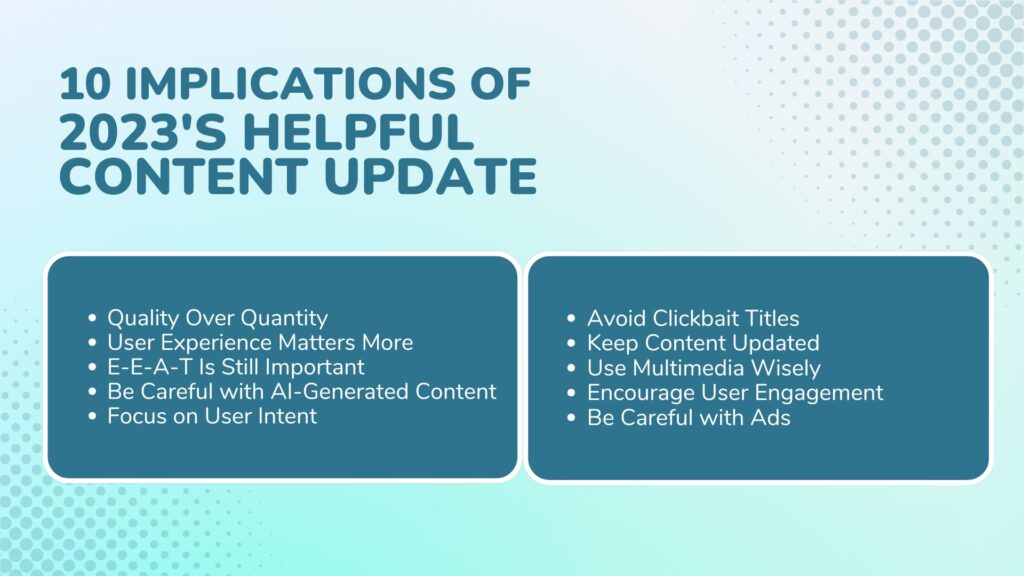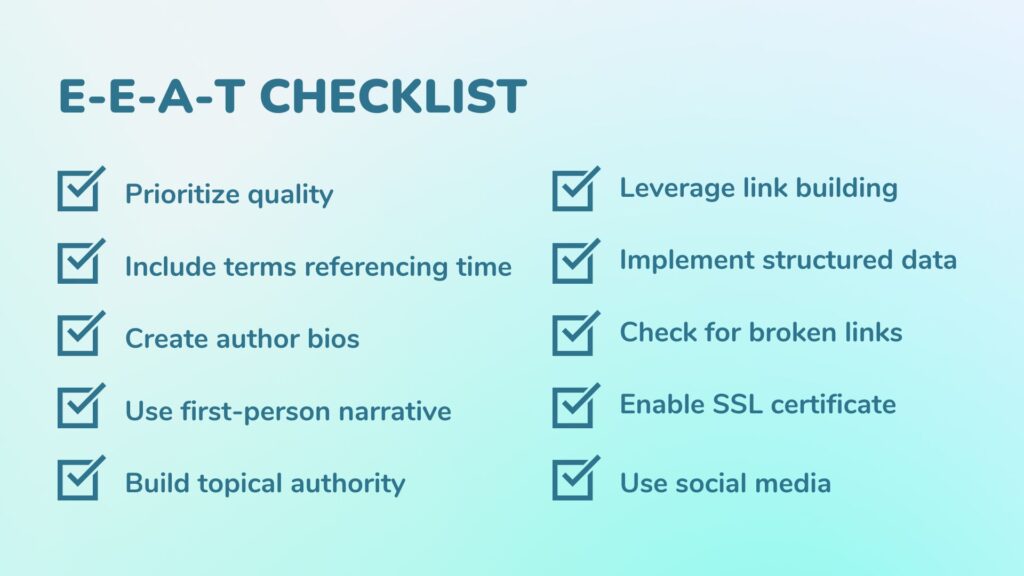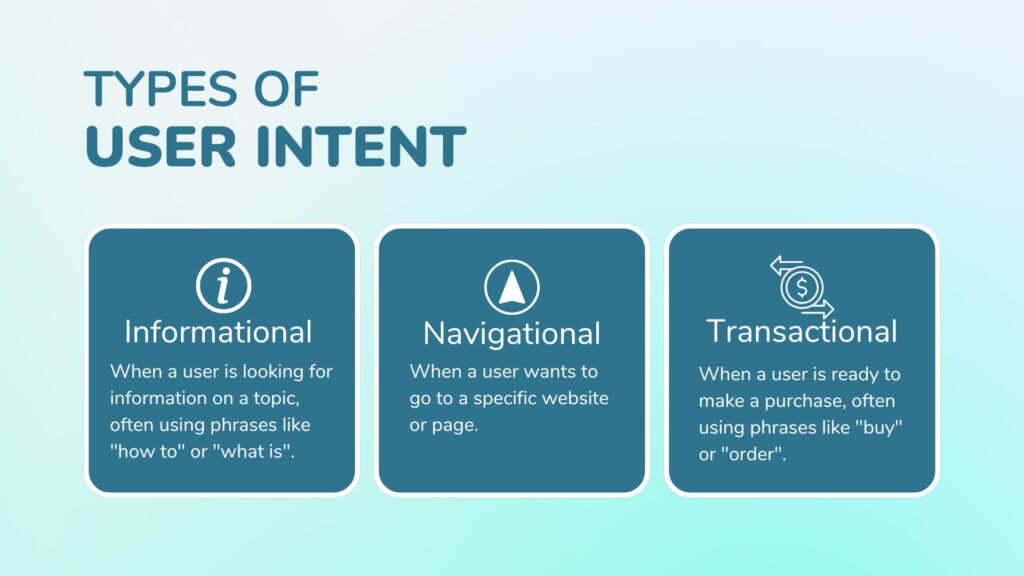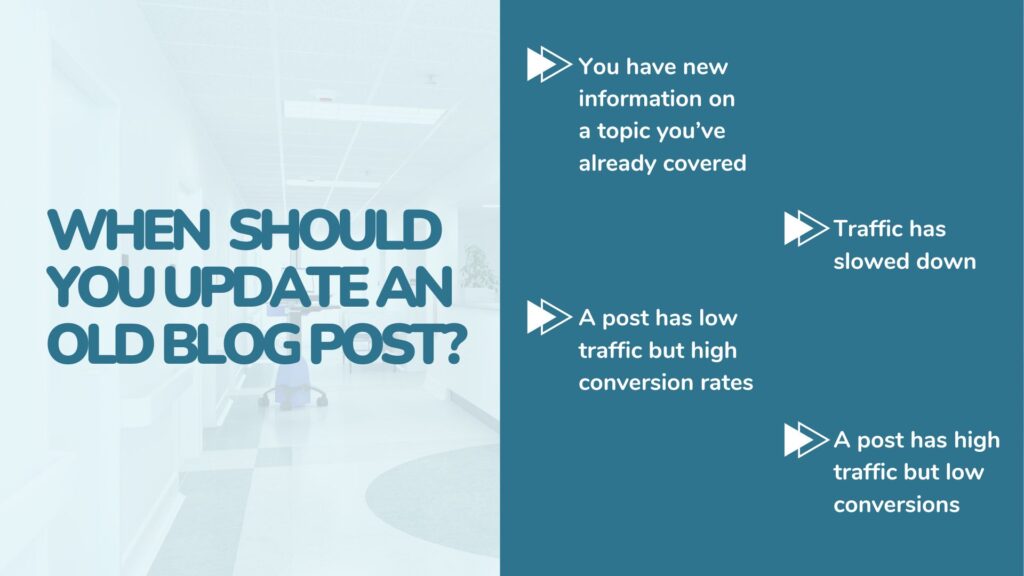10 Implications of 2023’s Helpful Content Update

Google’s 2023 Helpful Content Update has changed the way websites need to think about SEO. This update focuses on rewarding sites that provide valuable and user-friendly content.
The update prioritizes content created primarily for human readers, not search engines. Let’s explore the key implications of this significant algorithm change that had many site owners scrambling to adjust their content strategies.
In this article:
- Quality Over Quantity
- User Experience Matters More
- E-E-A-T Is Still Important
- Be Careful with AI-Generated Content
- Focus on User Intent
- Avoid Clickbait Titles
- Keep Content Updated
- Use Multimedia Wisely
- Encourage User Engagement
- Be Careful with Ads
1. Quality Over Quantity
The update means that having lots of pages isn’t enough. Your content needs to be helpful, relevant, and answer people’s questions. Google now prioritizes depth and relevance over sheer volume of content.
Websites should focus on creating comprehensive, well-researched articles that genuinely solve user problems. This means diving deep into topics, providing unique insights, and offering clear, actionable information. Instead of churning out multiple shallow articles, concentrate on crafting fewer but more substantive pieces that truly address user queries and provide meaningful value.
2. User Experience Matters More
Make sure your website is easy to navigate. Visitors should find what they’re looking for without trouble. This means implementing clear site structures, intuitive menus, and responsive design that works seamlessly across devices.
Page load speed becomes critical. Slow-loading pages frustrate users and can negatively impact rankings.
Consider using clean, uncluttered layouts that guide visitors naturally through your content. Plus, make sure that your website’s design supports readability, with appropriate font sizes, good color contrast, and strategic use of white space to enhance overall user comprehension and engagement.
3. E-E-A-T Is Still Important
E-E-A-T stands for Experience, Expertise, Authoritativeness, and Trustworthiness. Show that you know your stuff. This means including author bios that highlight real-world experience, citing credible sources, and demonstrating genuine knowledge in your field.
For specialized topics like medical or financial advice, having credentials or professional background becomes even more crucial. Showcase your unique perspective and practical insights that go beyond generic information.
Use case studies, personal anecdotes, and concrete examples to prove your understanding and build reader trust. Additionally, build backlinks from reputable sites and get mentions from experts in your field to boost your authority.

4. Be Careful with AI-Generated Content
With the rise of AI writing tools, many websites rushed to generate content using AI. However, the Helpful Content Update discourages auto-generated content.
While AI tools can assist in research and drafting, they cannot replace the authenticity and contextual understanding that comes from real human experience and expertise. As such, if you use AI tools, make sure to edit and add your own insights based on your experience and expertise. This way, your content remains unique and genuinely helpful.
The key is to use AI as a collaborative tool, not a replacement for human creativity and insight.
5. Focus on User Intent
Think about what people are really looking for when they search. Make sure your content matches their needs.
For instance, if someone searches “best running shoes,” they likely want comparative reviews and recommendations, not just a generic description of running shoes.
Understand the underlying motivation behind the search query. Are they looking to buy, seeking advice, or wanting in-depth information? Then, tailor your content to directly address these specific user intentions, providing clear, actionable insights that match the searcher’s main goal and deliver immediate value.
Use keyword research to understand different types of user intent: informational, navigational, transactional, and commercial. Use tools like Google Search Console and analytics platforms to gain deeper insights into how users interact with your content, allowing you to continuously refine and optimize your approach to meet evolving user needs and search intent.

6. Avoid Clickbait Titles
Don’t use misleading headlines to get clicks. Your title should reflect what the content is about.
Google has always penalized clickbait titles since the Panda and Penguin updates. The search engine has continued to refine its algorithm to uphold content quality standards, leading to the HCU. Clickbait titles might generate initial clicks, but they ultimately damage user trust and lead to higher bounce rates.
Your headline should accurately represent the content’s value, setting clear expectations for readers. This means crafting titles that are descriptive, engaging, and genuinely reflective of the in-depth information or solution your article provides, thereby building credibility and encouraging longer user engagement.
You can definitely optimize titles for SEO but keep them honest and relevant to your main topic.
7. Keep Content Updated
Check your old posts and update any outdated information. SEO is dynamic, and search engines favor fresh, current content.
Review your articles regularly to ensure they reflect the latest information, trends, and developments in your field. This might involve updating statistics, adding recent case studies, or revising outdated advice.
Set up a content audit schedule. Consider creating a quarterly or bi-annual review process where you systematically go through your content library. Use analytics tools to identify which pieces are losing traffic or becoming less relevant.
Update older articles with new insights, remove outdated references, and add current examples. This proactive approach not only keeps your content fresh but also signals to search engines that your website is actively maintained and committed to providing current, valuable information to users.

8. Use Multimedia Wisely
Add images or videos to make your content more engaging. In fact, videos had a 92.3% audience reach, which indicates their powerful impact on user engagement. Strategically placed multimedia can break up text, illustrate complex concepts, and keep readers interested.
Make sure all visual content is high-quality, relevant, and optimized for fast loading. Use alt text for images to improve accessibility and provide additional context for search engines.
Consider creating custom graphics, infographics, or short explanatory videos that complement your written content and provide additional value to your audience.
9. Encourage User Engagement
Implement interactive elements like polls or quizzes. BuzzFeed is a great example of using polls and quizzes to boost user engagement. The website specifically has a “Quizzes” section with entertaining and interactive pieces like Choose Your Top Singers And We’ll Reveal If You’re The Sun Or Moon or This Or That? Choose Between These 2000s Movies.
This tactic not only increases time spent on your page but also provides valuable insights into user preferences. By creating interactive content that encourages participation, you transform passive readers into active contributors.
10. Be Careful with Ads
Too many ads can make your site look spammy. Keep them to a minimum, like one or two strategically placed advertisements that don’t disrupt the reading experience.
Consider using less intrusive ad formats like sidebar placements or native advertising that blend seamlessly with your content. Monitor your site’s loading speed and user experience metrics to ensure ads aren’t negatively impacting site performance or driving readers away.
Focus on User-First Content
The 2023 Helpful Content Update is all about making the Internet better for users. By focusing on high-quality, user-centered content, you can improve your website’s rankings and provide real value to your visitors. Whether you’re new to SEO or have been doing it for years, these ten implications can help you adjust your strategy for success.
Building great content is just the first step. Link Genius helps you boost your site’s credibility through smart off-page SEO strategies. With Link Genius, you can earn high-quality backlinks and manage your outreach easily.
Book a demo today, and let us help you take your SEO to the next level.
